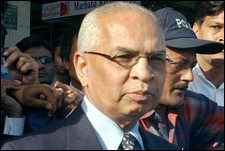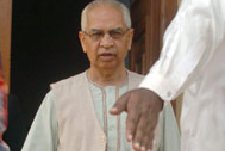Adil Najam
The swearing in of Justice Rana Bhagwandas as the Acting Chief Justice (ACJ) of Pakistan is not a ‘historical’ event in and of itself. However, Justice Bhagwandas now has a historical opportunity before him to influence the both the history of the institution he represents (the Judiciary) as well as the history of the country.


First some points of context:
- This is NOT the first time that Justice Bhagwandas has been the Acting Chief Justice. Indeed, as the next most senior judge on the Supreme Court, he has been called on to take this role before. Regular readers of ATP would remember seeing his picture here back in January in relation to a decision on Basant that he had then given, also as ACJ.
- Remember that he is the ‘Acting’ Chief Justice; the assumption and the point of fact being that Justice Iftikhar Chaudhry is still the Chief Justice.
- Even if he were to be appointed the Chief Justice eventually, he would not be the first non-Muslim Chief Justice of Pakistan. In fact, Justice Alvin Robert (A.R.) Cornelius served on the Supreme Court of Pakistan for 17 years, nearly 8 years of those as Chief Justice. Indeed, he is widely regarded as amongst the most respected and well-known Pakistanis to have held that office.
Indeed, it is a little disconcerting that his taking over this office – which was the procedurally appropriate thing to be done – is raising such attention. It is doing so, partly, on the assumption that the appointment of Justice Javed Iqbal as ACJ before him had some sinister purpose. Largely, it is because most Pakistanis have only just realized that Justice Bhagwandas is a practicing Hindu, and there are clearly those who want to make this an issue, even questioning his appropriateness for that reason. It is also, I think, that people’s faith in the judicial process is so low that they assume that he will soon, necessarily, assume the office of the Chief Justice. (It should be added that he is slated to retire at the age of 65, which happens this December; Justcie Iftikhar, on the other hand, does not retire till 2013).
Justice Rana Bhagwandas is – as, in fact, was Justice Javed Iqbal before him – considered to be a highly respected judge of high intellectual caliber and personal integrity. Born in 1942, Justce Bhagwandas became a lawyer like many other educated Sindhi Hindus and also has a post-graduate degree in Islamic studies and is considered an expert on constitutional law. He was a practising lawyer for about two years before being appointed to the bench in July 1967; he became a judge of the Sindh High Court in 1994; and of the Supreme Court in 2000. A challenge to his appointment to the higher judiciary on the grounds that he was a non-Muslim was dismissed by the Sindh High Court in 2002.
It is (a) because the prescribed procedure was followed here in his appointment, and (b) because he is a highly respected judge and a constitutional expert, that one should focus on this appointment. He is obviously aware of the historical decisions ahead of him. His first statement after taking his oath could be misconstrued as over-enthusiastic but one would like to believe that there is no hidden message in this statement and he is merely being diplomatic. According to The News:
Acting Chief Justice of Pakistan (ACJP), Rana Bhagwan Das has said that the presidential reference against Justice Iftikhar Chaudhry would be dealt with adequately. Talking to the media after taking oath as ACJP, Justice Bhagwan Das told that the Supreme Judicial Council would be taking a decision on the issue of holding the hearing of the reference in open or in camera. He said that the judiciary would not disappoint the people and the nation would soon hear the good news.
The history of the Pakistan Supreme Court and of Justices in this situation is a ‘busy’ one. Too busy, in my opinion. But it is not an even one. There have been shameful examples when the courts have allowed themselves to become tools in the hands of military and political leaders; but there have also been times when the Justices have made the nation proud by standing up to all pressures and deciding solely on the merit of the cases.
Judges, of course, love to hear about precedent. Here, the precedence lies in both direction. The question is, which precedent will Justice Rana Bhagwandas follow?
For anyone interested in the history of the Judiciary in such cases – both good and bad – do watch this very informative BBC report on the subject.
http://youtube.com/watch?v=_gE39xhnm0w



















































For all those who have praised Allah and Musharraf for the last 7 years; see the video below to see that only Allah is worthy of praise and the other one is simply a rat in uniform;
http://www.ibnlive.com/videos/36186/pak-channel-de fies-mush-gets-police-treatment.html
An interesting article by Eric Margolis of Toronto Sun.
Enjoy:
The Chief Justice was brought to the office of the Army (illegal) chief and pressure was put on him to resign.
Today Mir Zafarullah Jamali was brought in to the same office to pressure him not to resign.
A reference was brought against the Chief Justice for using a government helicopter.
On May 12th. in Karachi government officials tried their level best to forcibly put him in to a helicopter.
In Karachi the Chief Minster Arbab Rahim says ‘We will not allow any one to disturb the peace’ We will do it our selves!
Controversial but True:
Out of the 19 Generals promoted by Musharraf, 9 were Urdu speaking from Karachi and 4 were Punjabi’s. There were no promotions from Baluchistan or Sind or NWFP.
It is hard to understand the mentality of people who migrated from India and currently call themselves “Muhajir’s”. They tend to work with clan mentality and have a desire to rule the entire country with a 13% population representation. Unfortunately the Pak Army Generals supported Musharraf without looking at his origin but the very same person getting an opportunity acts like a true “Altaf Bhai”!
If Musharraf does not change his tactics, very soon there will be a military dissant that can lead to a hostile take over by another General. That will be the first time in Pakistan’s Army and the consequences will be disastrous. There are rumours that this issue is already becoming a topic within the military establishment!!
ISLAMABAD: The Lahore rally, dominated by certain anti-government elements, lacked public support and negated basic democratic norms, Information Minister Muhammad Ali Durrani said on Sunday.
Talking to various private TV channels, Durrani said the government had not created any hurdle in the way of Chief Justice Iftikhar Muhammad Chaudhry from Islamabad to Lahore. “We recognise people’s right to the freedom of expression, considering it an integral part of real democracy.â€
Democracy comes via balloting, not through rallies: Durrani
PART OF THE TEXT:
Quote;
ISLAMABAD: Information minister Muhammad Ali political colour. On the other hand the opposition parties are playing politics over judicial issue.
It is our belief dictatorial regime can not stay, he remarked. We will have to draw boundary lines to save the institutions from the politics, he urged. We will have to keep all the institutions including judiciary away from the politics.
Unquote
DOES THE INFORMATION MINISTER REALIZE THAT PAKISTAN ARMY IS ALSO AN INSTITUTION? HE TALKS ABOUT KEEPING ALL INSTITUTIONS INCLUDING JUDICIARY AWAY FROM POLITICS. WHAT ABOUT ARMY??? OR DOES HE CONSIDER PAK ARMY A POLITICAL INSTITUTION NOW!